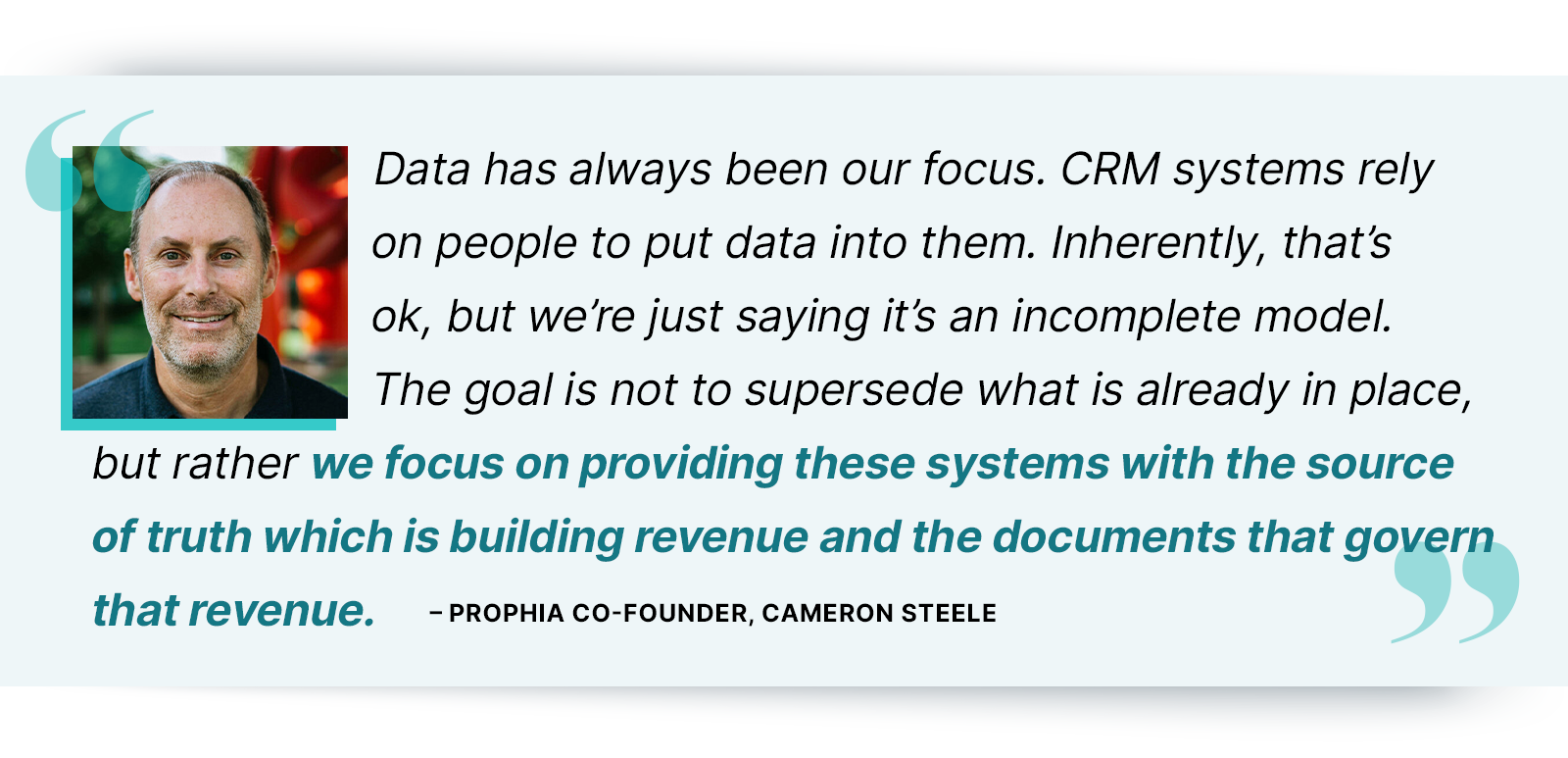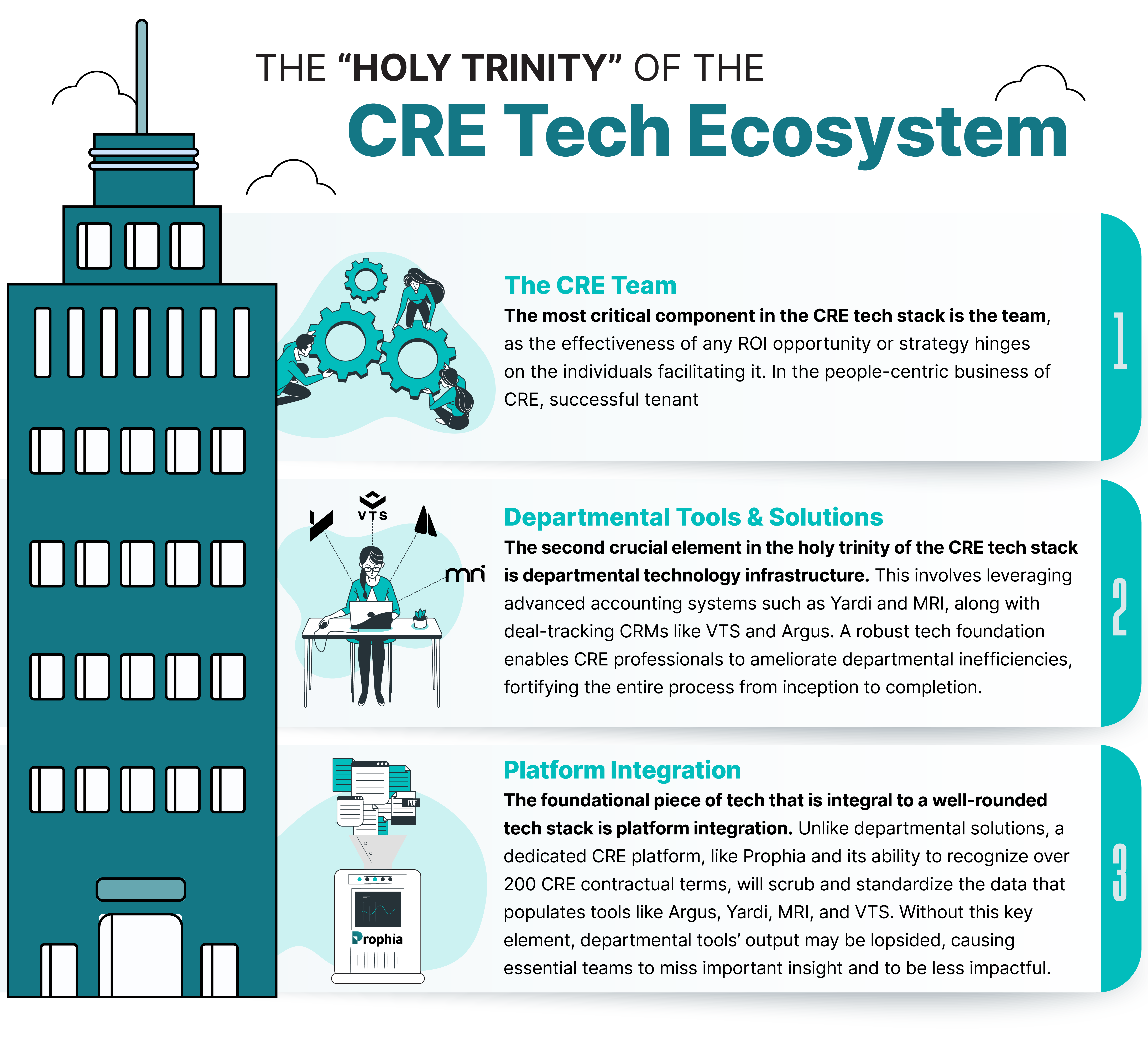The “Holy Trinity” of the Tech Ecosystem for CRE Operators
Is there a one-size-fits-all tech combination for CRE leaders today? We explore what the modern CRE tech stack looks like as Proptech trends roll in and out and market challenges shift.

The world of commercial real estate is in a state of transformation. From shifting capital access to foreboding vacancies, it seems every asset class is facing its own set of challenges and growth opportunities. Changes to the investor and capital landscape have made it imperative for CRE teams to shift strategies and seek new ways to support NOI-generating activities.
One such method includes leaning on technology to streamline tasks or improve business intelligence. This strategy isn’t anything new or revolutionary. In fact, given the unprecedented state of the markets, CRE has been stubbornly slow when it comes to technology adoption.
But which key pieces of technology should CRE teams invest in today to build a healthy tech ecosystem and stay ahead? We’re taking a deep dive into the three solutions–the holy trinity–CRE leaders need to compete in the market landscape of tomorrow.
Jump To A Section in This Article
Departmental Proptech Solutions: The Old Guard
Today's Proptech Trends and Evolving Needs of CRE Leaders
The New Frontier: Platform Adoption
The "Holy Trinity" of the CRE Tech Ecosystem
Departmental Proptech Solutions Have Long Reigned Supreme
We have written extensively about the needs of today's and tomorrow’s CRE leaders, and it seems every department’s tech needs are nuanced and different. This has caused a lot of CRE firms to adopt tech at a departmental level. For instance, property managers and landlords will rely heavily on tenant experience software, like HqO, to understand the operational needs of their properties. Meanwhile, capital markets and investment teams rely on ARGUS to project forward cash flows of a building and make a sale.
And this arrangement doesn’t appear to be going anywhere anytime soon. Big tech players in CRE, like VTS, have made strategic acquisitions in recent years to venture into departments that weren’t previously covered by their technology solutions. Further solidifying that the CRE tech stack has long been arranged according to the requirements of each department and not the holistic experience of one’s portfolio.
At a glance, this departmental approach makes sense; every team gets the tech solution they need to streamline their tasks and innovate. However, inefficiencies can occur when it comes time to collaborate, share information, aggregate data, or verify the accuracy of the data coming from those systems. This is a reality that is becoming more and more difficult to reconcile as historically sound asset groups continue to struggle, investor reporting demands go up, and the vacancy schedule fills.
The Evolving Needs of CRE Leaders and Current Trends Happening in Proptech
The unprecedented state of CRE and capital availability has thrown many business norms into the balance, including tech adoption. CRE leaders are much more scrupulous when it comes to budgeting, buying, and integrating new tech. This has caused certain CRE technology trends to fade into the background while others surface.
Automation is now the norm.
With deal volume decreasing, CRE teams can’t allow internal process inefficiencies to slow their leasing momentum. That is why task automation has become integral to CRE technology adoption. Technology vendors must be able to provide CRE teams with some level of workflow automation to even be considered by busy teams.
Big data and AI.
As one of the largest business asset classes in the world, CRE deals can generate a huge amount of data within a single transaction. That’s why Proptech solutions need to come equipped with superior data-processing capabilities as well as the ability to swiftly interpret that data. Big data and AI have long been a focus for leaders in CRE and it continues to be a big ticket item for the CRE tech stack.
Vertical integration.
Both vertical and horizontal tech solutions have their place in a tech ecosystem, but vertical solutions provide slightly more in the way of strategy thanks to domain-specific expertise. Unlike horizontal systems, vertical AI focuses on a singular, specialized subject, leading to more precise and reliable results and greater data accuracy.
Data quality and accuracy.
Success in achieving a favorable ROI and deal execution is hinged on the accuracy and currency of data. Traditionally, Proptech trends focused on enhancing workflows, but there's a notable shift among CRE leaders toward prioritizing the quality of data that sustains departmental systems. This shift creates a demand for platform integration that can effectively manage crucial data, serving as the foundation for tools like Yardi, ARGUS, or JDE. Recognizing the pivotal role of accurate and up-to-date data, this evolution aims to optimize overall performance.
A Shift From Departmental Proptech Solutions to Platform Adoption
The shift from departmental solutions to platform integration has been happening gradually for years in CRE. Tools like Yardi, VTS, MRI, and JDE provide key CRE players with workflow solutions that make jobs easier at the department level, but many of these solutions are missing the holistic approach to portfolio performance. They can certainly help integral teams impact ROI, but if the data fueling them is not standardized or accurate, the output of these workflow solutions can suffer.
The way to alleviate this issue is to bridge data quality gaps and this objective has been Prophia’s focus since the cross-departmental platform was first founded in 2018. Since then, every product improvement, partnership, and customer relationship has always tied back to the original objective: managing that source of truth for CRE.

And this is a universal sentiment from CRE partners who use Prophia today to boost the output of the departmental solutions they already have in place. Since integrating Prophia with the rest of RXR’s leasing ecosystem, VP of Leasing, Alexandra Badell stated “I always trust a lease more than abstract and Prophia’s ability to link back to any original source document has alleviated uncertainty I used to feel.” This is just one example of a legacy CRE team experiencing the benefit of data quality improvements after making a “platform play” with their tech adoption strategy.
The “Holy Trinity” of the CRE Tech Ecosystem
While there isn’t necessarily a “secret combo” when it comes to picking the right tech, there are three key elements, or the “holy trinity”, that round out a tech stack.
The CRE team.
The first piece is the team. The effectiveness of any ROI opportunity or strategy starts with the individuals facilitating it. CRE is a people’s business. Tenant relationships, deal execution, portfolio growth, and diversification all rely on collaboration and network connections to be successful. CRE tech is totally ineffective without dedicated experts and individuals facilitating every opportunity from start to finish.
But when the people behind these deals are bogged down with process inefficiencies, growth opportunities eventually get throttled. With key individuals spending 4-6 weeks each quarter aggregating and interpreting complex data, it takes the strategic focus off of leasing opportunities and onto administrative tasks. This necessitates the need for the second pillar in the CRE tech stack.
Departmental solutions.
The second crucial element in the holy trinity of the CRE tech stack is departmental technology infrastructure. While the team lays the groundwork, the right tech tools empower them to optimize efficiency and amplify their capabilities. These tools range from advanced accounting systems like Yardi and MRI to deal-tracking CRMs like VTS and ARGUS.
A robust tech foundation equips CRE professionals with the means to ameliorate departmental inefficiencies, thereby fortifying essential processes from start to finish. This coordination between a skilled team and cutting-edge technology forms the bedrock of success when navigating market challenges and ensuring that opportunities are not only identified but maximized.
Data quality and platform integration.
With departmental solutions and a dedicated team, a healthy CRE tech stack also needs an integrated platform capable of scrubbing and managing the quality of the data that populates those systems. This includes capturing key terms in existing and historical leasing data so CRE teams have the most holistic view of the assets and properties in their portfolio.
Today, Prophia is the only platform on the market today built to handle the data demands of a diverse CRE portfolio. Thanks to the laser focus on data quality, Prophia has successfully built the most comprehensive database of proprietary CRE data on the market today. This has allowed Prophia’s AI to maturate into a model that understands over 200 unique CRE terms contained in complex leases as well as visibility into encumbrances, the ability to clear and track critical dates, and the ability to build reports based on this data.
The CRE technology landscape has transformed, shifting from a historical reliance on departmental solutions to a focus on platform integration. Current trends underscore the importance of data quality, automation, big data, and artificial intelligence in optimizing CRE operations. The "Holy Trinity" of the CRE tech ecosystem—comprising a dedicated team, departmental solutions, and robust data quality with platform integration—now defines success. Platforms like Prophia, prioritizing data quality across diverse portfolios, reflect the industry's recognition of the need for comprehensive solutions beyond department-specific tools. This integrated approach ensures efficient workflow, accurate data, and success in the competitive and dynamic CRE environment.
If you would like to harness the power of next-generation AI and overcome some of today's most daunting market challenges, contact the Prophia team to learn about platform adoption for CRE.
Hannah Overhiser
Hannah is Prophia's Content Marketing Manager and a seasoned B2B and B2C marketer. Her career began in eCommerce consulting with a focus on code testing. This technical expertise transferred seamlessly to SEO and she started working agency-side as an SEO and Content Strategist. Today, her home is Prophia, and she puts...


